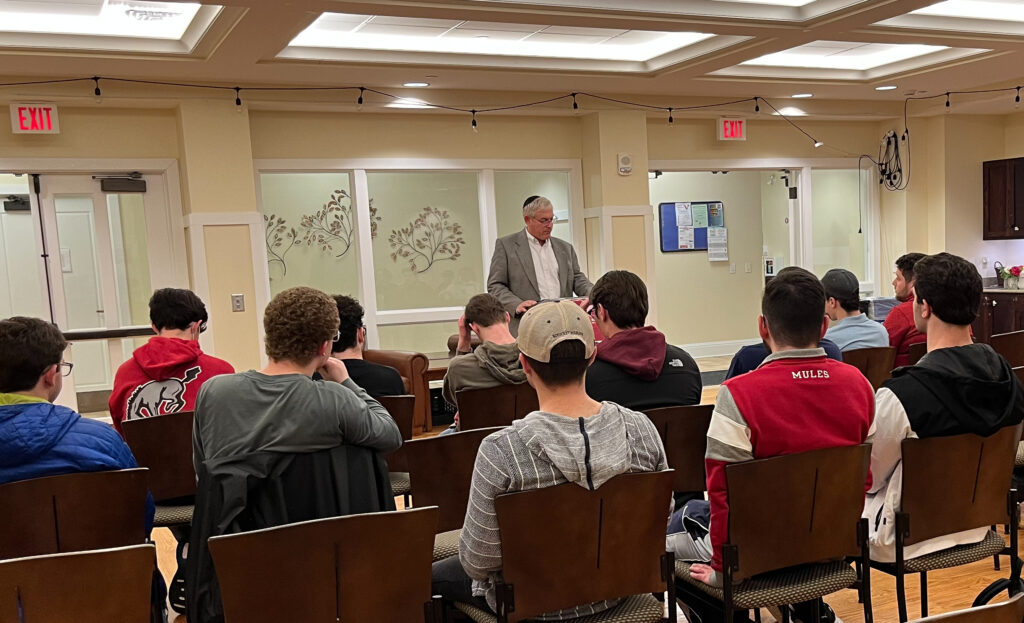Last week, “Some Unusual Responses to the Rise of Nazism” was at the forefront of Marc B. Shapiro’s, Ph.D., talk at The Leffell Center, which was followed by the second Campus Living Room Project chat of the semester. Shapiro gave voice to a somewhat controversial, hard to hear, yet current Holocaust conversation on the history of this dictator-led genocide and its relevance to the politics of today. This topic and many more like it, though important to be discussed, require more communal support in regard to their intensity. Such topics are why Muhlenberg formed the Campus Living Room Project, which seeks to bring together members of the community with varying perspectives, to create a safe space for reflection, commentary and togetherness directly following events and religious holidays on campus.
According to Dean of Students Allison Williams, this initiative has been in the works by members of the faculty for roughly a year before deciding to kick it off this semester. “We thought about waiting until it was just perfect to launch, but then we felt we can adjust it, grow it and mold it with students as we go, so let’s just start the conversations!”
The project is designed to be a safe space for all students and faculty. When commenting on the name given to this series, Williams stated that “[living rooms] are places that are intended to feel comfortable and safe and yet have unwritten rules promoting controversy with civility, reparation of harm and an understanding of and empathy toward the human condition.” It is important for all people involved to feel valued and included in this dialogue, and in some ways, it may have different meanings for different people. Though these topics may be complex, Williams argues that it is important that people feel comfortable having discussions like these, to build their understanding of others, learn from experiences that may differ from their own and share their perspectives with a welcoming group.
“[living rooms] are places that are intended to feel comfortable and safe and yet have unwritten rules promoting controversy with civility, reparation of harm and an understanding of and empathy toward the human condition.”
The Campus Living Room Project has held two discussions thus far. The first one, held on Yom Kippur, focused on belonging, where the group shared their thoughts on what it means to belong on college campuses, in student groups, and in the greater global community. Not only did the group provide insight into their own personal experiences, they also explored the ways in which a sense of belonging can be created for others, both on and off campus.
The conversation post-Shapiro’s event was headed up by Hillel Director Ira Blum ‘10. Blum opened the floor to dialogue regarding what folks can learn from past historical events, and how these ideas can help tackle today’s challenges.
“It opened my eyes to a new viewpoint,” said Nolan Eichorn ‘26 upon attending the discussion. He also commented that as a non-Jewish attendee, it was a beneficial learning opportunity, and a “valuable experience [that has] allowed me to understand an important part of history from a new perspective.”
“It opened my eyes to a new viewpoint”
The goal of this project appears to be that people will come to expect discussions and be open and ready for them after events. Williams reflected this, stating that in the foundation of this initiative “student groups can propose and lead topics of discourse or they can join faculty or staff-led conversations from time to time. As events unfold across the globe, this project also aims to create a space that students naturally seek out and convene for discussion, difficult dialogue and as space in which harm can be repaired within and among communities.”
On Oct. 18 The Campus Living Room Project held a discussion as follow-up for Muhlenberg’s recent production of “We Are Proud to Present a Presentation About the Herero of Namibia, Formerly Known as Southwest Africa, From the German Südwestafrika, Between the Years 1884–1915,” with this discussion open to Black students, faculty and staff and a second discussion on Oct. 24 second open to all members of the College community. Everyone is encouraged to attend one or both of these sessions as they see fit.

